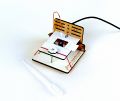No edit summary |
(→Ethics) |
||
| Line 11: | Line 11: | ||
*Responsibility. Recognize the complexity and dynamics of living systems and our responsibility towards them. | *Responsibility. Recognize the complexity and dynamics of living systems and our responsibility towards them. | ||
*Accountability. Remain accountable for your actions and for upholding this code. | *Accountability. Remain accountable for your actions and for upholding this code. | ||
==Microscopy== | ==Microscopy== | ||
Latest revision as of 13:38, 23 October 2018
Ethics
Draft DIYbio Code for ethics from European congress
- Transparency. Emphasize transparency and the sharing of ideas, knowledge, data and results
- Safety. Adopt safe practices
- Open Access. Promote citizen science and decentralized access to biotechnology.
- Education. Help educate the public about biotechnology, its benefits and implication.
- Modesty. Know, you don’t know everything.
- Community. Carefully listen to any concerns and questions and respond honestly.
- Peaceful Purposes. Biotechnology must only be used for peaceful purposes.
- Respect. Respect humans and all living systems.
- Responsibility. Recognize the complexity and dynamics of living systems and our responsibility towards them.
- Accountability. Remain accountable for your actions and for upholding this code.
Microscopy

"Principle of immersion microscopy. Path of rays with immersion medium (yellow) (left half) and without (right half). Rays (black) coming from the object (red) at a certain angle and going through the coverslip (orange, as the slide at the bottom) can enter the objective (dark blue) only when immersion is used."(https://en.wikipedia.org/wiki/Oil_immersion)
Microscope Use
Microscopy with Oil Immersion
"In light microscopy, oil immersion is a technique used to increase the resolving power of a microscope. This is achieved by immersing both the objective lens and the specimen in a transparent oil of high refractive index, thereby increasing the numerical aperture of the objective lens. Immersion oils are transparent oils that have specific optical and viscosity characteristics necessary for use in microscopy."(https://en.wikipedia.org/wiki/Oil_immersion)
Further read and how to: http://www.micrographia.com/tutoria/micbasic/micbpt07/micb0700.htm

